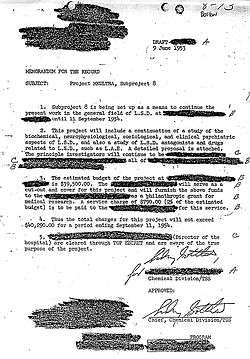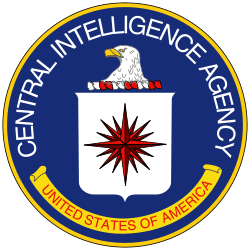Sidney Gottlieb
Sidney Gottlieb (born Joseph Scheider; August 3, 1918 – March 7, 1999) was an American chemist and spymaster best known for his involvement with the Central Intelligence Agency's 1950s and '60s assassination attempts and mind control program, known as Project MKUltra.
Biography
Early years
Gottlieb, the son of Hungarian Jewish immigrant parents, was born in the Bronx as Joseph Scheider in 1918. He received a Ph.D. in chemistry from the California Institute of Technology. A stutterer from childhood, Gottlieb also earned a master's degree in speech therapy. He had a club foot, which kept him out of service in World War II, but did not prevent his pursuit of folk dancing, a lifelong passion.[1]
Government career
1950s
In 1951, aged 33, Gottlieb joined the Central Intelligence Agency (CIA). As a poison expert, he headed the chemical division of the Technical Services Staff (TSS). Gottlieb became known as the "Black Sorcerer" and the "Dirty Trickster."[2] He supervised preparations of lethal poisons and drug experiments in mind control.
In April 1953 Gottlieb became head of the secret Project MKULTRA, which was activated on the order of CIA director Allen Dulles. In this capacity, he administered LSD and other psycho-active drugs to unwitting subjects and financed psychiatric research and development of "techniques that would crush the human psyche to the point that it would admit anything". He sponsored physicians such as Ewen Cameron and Harris Isbell in controversial psychiatric research including nonconsensual human experiments.

Gottlieb was the liaison to the military subcontractor Lockheed, then working on Project Aquatone for the C.I.A. which would later be known as the U-2 spy plane. In 1953 he procured a safe house for the Lockheed Aeronautics Services Division (L.A.S.D.) which had easy egress for secretive affairs.
By 1955 the project had grown so large that a new procurement was needed. At this point subproject 27 was merely a funding subproject which combined all previous subprojects, including those involving LSD, payment to Sandoz Pharmaceuticals, magic and John Mulholland's The Official CIA Manual of Trickery and Deception (subproject 15 magic support, Mulholland Supplement), and the procurement of more LSD (subproject 18) but it continues on to include almost 150 known and documented subprojects including a microwave gun and the search for alternatives to LSD which led to the later programs like Project MKCHICKWIT, most of which focused on South America and mushrooms.
The CIA in addition to working with subcontractors like Lockheed also worked with other branches of the government, namely the Advanced Research Projects Agency (ARPA) of the Department of Defense and the Office of Naval Intelligence, though it is unclear what role if any Gottlieb played in these affairs other than authorizing them.
1960s
In March 1960, under The Cuban Project, a CIA plan approved by President Eisenhower—and under the direction of CIA Directorate for Plans, Richard M. Bissell—Gottlieb proposed spraying Fidel Castro's television studio with LSD and saturating Castro's shoes with thallium to make his beard fall out. Gottlieb also hatched schemes to assassinate Castro, including the use of a poisoned cigar, a poisoned wetsuit, an exploding conch shell, and a poisonous fountain pen.
[3]
Gottlieb also played a role in the CIA's attempt to assassinate Prime Minister Patrice Lumumba of the Congo; he took a vial of poison to the Congo with plans to place it on Lumumba's toothbrush in the summer of 1960.[4][5] He transported these "toxic biological materials" to Larry Devlin, the CIA station chief in the Congo, although Devlin declined the assignment and a military coup soon deposed Lumumba by other means.[6] Gottlieb also wanted Iraq's General Abdul Karim Qassim's handkerchief to be contaminated with botulinum.
Final years
Gottlieb retired from the CIA in 1972, stating at the time that he did not believe his work had been effective. He nonetheless received a Distinguished Intelligence Medal from the U.S. government. Visited in retirement by the son of his late colleague Frank Olson, he was residing in an "ecologically correct" home in Culpeper, Virginia, where he raised goats, ate yogurt and advocated principles of peace and environmentalism.[7] He and his wife spent 18 months running a leper hospital in India and he spent his final years looking after the dying at a hospice.
On March 7, 1999, Gottlieb died at his home in Washington, Virginia.[8] He was reported to have a history of heart issues;[8] however, his wife declined to state the cause of death.[9]
References
- ↑ Rupert Cornwell, "Obituary: Sidney Gottlieb", The Independent, March 16, 1999
- ↑ Hollington, Kris (2013). "Chapter Four: The Black Sorcerer". Wolves, Jackals, and Foxes: The Assassins Who Changed History. New York: St. Martin's Press. p. 34. ISBN 1429986808. Retrieved September 6, 2015.
- ↑ Hollington, Kris (2013). "Chapter Four: The Black Sorcerer". Wolves, Jackals, and Foxes: The Assassins Who Changed History. New York: St. Martin's Press. ISBN 1429986808. Retrieved July 28, 2016.
- ↑ Coll, Steve. "Remote Control: Our Drone Delusion", The New Yorker, May 6, 2013. Retrieved on May 6, 2013.
- ↑ Weiner, Tim (2007), Legacy of Ashes: The History of the CIA, Doubleday, pg 163.
- ↑ Senate Church Committee on Lumumba
- ↑ Ignatieff, Michael (April 1, 2001). "What did the C.I.A. do to Eric Olson's father?". The New York Times Magazine. Retrieved January 17, 2013.
- 1 2 Barnes, Bart (March 11, 1999). "CIA Official Sidney Gottlieb, 80, Dies". The Washington Post. Retrieved August 15, 2015.
- ↑ Weiner, Tim (March 10, 1999). "Sidney Gottlieb, 80, Dies; Took LSD to C.I.A.". The New York Times. Retrieved August 15, 2015.
Other sources
- Holley, Joe (2005, June 16). "John K. Vance; Uncovered LSD Project at CIA". Washington Post, Page B08.
- Jacobs, John (1977, September 5). "The Diaries Of a CIA Operative". Washington Post, A1.
- Kettle, Martin (2000, August 10). "President 'ordered murder' of Congo leader". The Guardian.
- Marks, John (1991). The Search for the "Manchurian Candidate". W.W. Norton & Company, Inc.
- Mazur, Suzan (2005, January 29/30). "Tempelsman's Man Weighs In on the Murder of Patrice Lumumba". CounterPunch.
